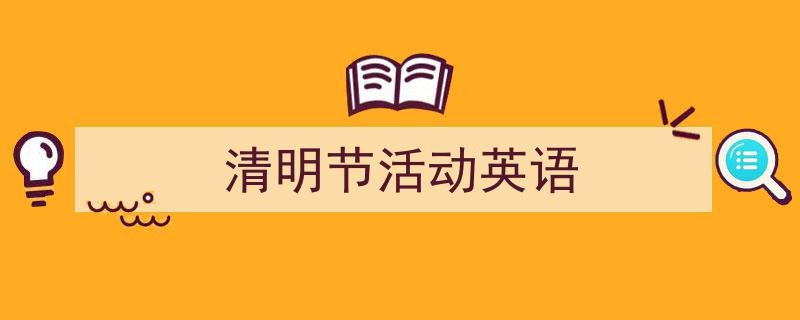欢迎来到格策美文网
怎么写《清明节活动英语》才能拿满分?(精选5篇)
更新日期:2025-05-03 11:43

写作核心提示:
Writing an English essay about the Qingming Festival (Tomb-Sweeping Day) requires attention to several key aspects to ensure clarity, cultural accuracy, and engaging content. Here are some important considerations:
1. "Introduction to the Qingming Festival:" - Begin with a brief introduction to the Qingming Festival, including its significance, historical background, and cultural importance in Chinese society.
2. "Cultural Context:" - Discuss the cultural significance of the Qingming Festival, such as its role in honoring ancestors, the importance of family ties, and the spiritual beliefs associated with the festival.
3. "Customs and Practices:" - Describe the traditional customs and practices observed during the Qingming Festival, such as tomb sweeping, offering food and paper money to ancestors, and flying kites.
4. "Historical and Social Impact:" - Explore the historical and social impact of the Qingming Festival, including its role in preserving Chinese heritage and the modern adaptations that have occurred over time.
5. "Personal Experiences or Observations:" - If applicable, share personal experiences or observations of the Qingming Festival, which can add a personal touch to the essay and make it more relatable.
6. "Language and Tone:" - Use a respectful and appropriate tone when discussing the festival and its customs. Avoid making light of or trivializing any cultural practices.
7. "Vocabulary and Terminology:" - Use accurate and culturally
用英文介绍清明节的万能模板 | 你也能轻松掌握!
清明时节雨纷纷,如何用英语向外国朋友介绍这个传统节日?今天我们为大家准备了一篇初中生适用的清明英文介绍范文,还有超实用的写作框架和必背词汇,让你轻松应对各种英语写作场景!清明英文介绍范文(300-500 词)
Qingming Festival: Remembering Our AncestorsQingming Festival, also called Tomb-Sweeping Day, is one of the most important traditional festivals in China. It usually falls on April 4th or 5th. On this day, Chinese people honor their ancestors by cleaning tombs and offering food, flowers, and paper money.What Do We Do on Qingming Festival?
First, families visit their ancestors' tombs. They sweep the tombs and put fresh flowers there. This shows respect and love for the dead. Second, people burn paper money and paper clothes. They believe these things can help ancestors live well in heaven. Finally, many families enjoy outdoor activities like flying kites and having picnics. The weather is usually warm and sunny, perfect for spending time together.Interesting Facts About Qingming
Long ago, there was a story about Jie Zitui, a loyal man. To remember him, people ate cold food for three days. That's why Qingming is also linked to the Cold Food Festival. Another tradition is planting trees. People think trees can protect their ancestors' tombs.Why Is Qingming Important?
Qingming Festival teaches us to remember our past and respect our family history. It's a time to connect with our roots and share stories about our ancestors. Even if we're busy, taking time to honor them is meaningful.Do you want to write your own Qingming introduction? Keep reading for useful words and sentence patterns!
必背词汇(10 个)
- ancestor
- 祖先
- commemorate
- 纪念
- traditional
- 传统的
- respect
- 尊重
- offer
- 供奉
- link
- 关联
- loyal
- 忠诚的
- meaningful
- 有意义的
- outdoor
- 户外的
- protect
- 保护
写作框架模板
开头句样式1.直接介绍节日"Qingming Festival is a special day when Chinese people..."2.用疑问句引发兴趣
"Do you know how Chinese people remember their ancestors?"
中间句样式1.列举活动"First, we..., second, we..., and finally..."
2.解释传统来源"Long ago, there was a story about..., so people started..."结尾句样式1.总结意义"Qingming Festival helps us remember our past and..."2.呼吁行动"Next time you celebrate Qingming, try to..."小练习
试着用模板写一段关于你家清明活动的英文介绍吧!例如:
"On Qingming Festival, my family and I usually..."需要更多帮助?留言告诉我们哦! 原版剑桥初中英语教材 ¥280 购买 <script type="text/javascript" src="//mp.toutiao.com/mp/agw/mass_profit/pc_product_promotions_js?item_id=7490420864702267938"></script>
用英语讲中国:清明节 Qingming Festival
Qingming Festival: A Timeless Celebration of Life and Remembrance
清明节:铭记生命的永恒庆典
Introduction
The Qingming Festival, one of the most significant traditional festivals in China, holds a special place in the hearts of the Chinese people. With a history spanning over 2,500 years, it serves as a time for people to pay respects to their ancestors, honor the deceased, and embrace the rejuvenation of nature. Combining elements of solemn commemoration and joyous celebration, the Qingming Festival reflects the profound values and rich cultural heritage of China. This article explores the origin, customs, cultural significance, and contemporary relevance of the Qingming Festival.
引言
清明节是中国最重要的传统节日之一,在中国人心中占据着特殊地位。其历史可追溯到 2500 多年前,是人们缅怀祖先、悼念逝者,同时迎接自然复苏的重要时刻。清明节融合了庄重的纪念和欢乐的庆祝元素,体现了中国深厚的价值观和丰富的文化遗产。本文将探讨清明节的起源、习俗、文化意义,以及在当代的重要性。
The Origin of the Qingming Festival
The roots of the Qingming Festival can be traced back to ancient China's agricultural calendar. Initially, Qingming was a solar term, marking the time when the temperature rises, rainfall increases, and it is suitable for farming. As time passed, the festival evolved, integrating various cultural and religious elements.
Some believe that the Qingming Festival has connections with the Cold Food Festival. Over time, the traditions of the two festivals gradually merged. The story of Jie Zitui, a loyal official during the Spring and Autumn Period, is closely associated with the origin of the Cold Food Festival. With the passage of time, the commemorative aspects of the Cold Food Festival were incorporated into the Qingming Festival, enriching its cultural connotations.
清明节的起源
清明节的起源可追溯到中国古代的农历。起初,清明是一个节气,标志着气温回升、降雨增多,适宜农耕。随着时间的推移,这个节日不断演变,融入了各种文化和宗教元素。
有人认为清明节与寒食节有关。随着时间的推移,两个节日的传统逐渐融合。春秋时期忠臣介子推的故事,与寒食节的起源密切相关。随着时间的推移,寒食节的纪念元素融入了清明节,丰富了其文化内涵。
The Customs of the Qingming Festival
Tomb - Sweeping
Tomb - sweeping is the most prominent custom of the Qingming Festival. Families gather at the gravesites of their ancestors to clean the tombs, offer sacrifices, and burn incense. They express their gratitude and remember the contributions of their forebears. This practice not only shows respect for the dead but also strengthens family bonds and a sense of heritage.
Spring Outings
Another important custom is going on spring outings. As the festival falls during early spring, when nature comes alive with blooming flowers and greenery, people take this opportunity to enjoy the outdoors. They visit parks, gardens, and scenic spots, flying kites, having picnics, and engaging in various recreational activities.
Eating Qingtuan
Eating Qingtuan, a traditional green rice ball, is also a common practice during the Qingming Festival. Made from glutinous rice and mugwort leaves, Qingtuan has a unique flavor. It is often filled with sweet red bean paste or other fillings, symbolizing the arrival of spring.
清明节的习俗
扫墓
扫墓是清明节最突出的习俗。一家人会聚集在祖先的墓前,清扫坟墓、献上祭品、焚香祭祖。人们借此表达感恩之情,铭记先辈的贡献。这种习俗不仅表达了对逝者的尊重,还增强了家庭凝聚力和文化传承意识。
踏青
另一个重要习俗是踏青。清明节正值早春,万物复苏,百花盛开,人们借此机会到户外游玩。他们参观公园、花园和景点,放风筝、野餐,进行各种娱乐活动。
吃青团
吃青团也是清明节的常见习俗。青团是一种传统的绿色糯米团子,由糯米和艾草叶制成,具有独特的风味。青团通常填充甜豆沙或其他馅料,象征着春天的到来。
The Cultural Significance of the Qingming Festival
The Qingming Festival plays a crucial role in preserving and transmitting Chinese traditional values. It reinforces the importance of filial piety, a core value in Chinese culture. By commemorating their ancestors, people uphold the traditions and wisdom passed down through generations.
The festival also reflects the Chinese view of life and death. It teaches people to respect life, cherish the present, and face death with dignity. The combination of tomb - sweeping and spring outings embodies the harmony between mourning and celebration, between the past and the present.
清明节的文化意义
清明节在传承中国传统价值观方面发挥着至关重要的作用。它强化了孝道这一中国文化的核心价值观。通过纪念祖先,人们传承了世代相传的传统和智慧。
这个节日也反映了中国人对生死的看法。它教导人们尊重生命、珍惜当下,坦然面对死亡。扫墓和踏青的结合,体现了哀悼与庆祝、过去与现在的和谐统一。
The Contemporary Relevance of the Qingming Festival
In modern times, the Qingming Festival continues to hold great significance. Despite the rapid pace of urbanization and technological advancement, people still attach importance to this festival. It serves as a reminder of their roots and a time for family reunions.
Moreover, the Qingming Festival has also taken on new forms. Online tomb - sweeping has emerged as a convenient alternative, allowing people who are unable to visit the gravesites in person to pay their respects. This innovation not only adapts to the changing times but also ensures the continuity of the festival's traditions.
清明节在当代的重要性
在现代,清明节依然具有重要意义。尽管城市化进程和技术发展迅速,人们仍然重视这个节日。它让人们铭记自己的根源,也是家人团聚的时刻。
此外,清明节也呈现出新的形式。网上扫墓作为一种便捷的替代方式出现,让无法亲自前往墓地的人也能表达敬意。这一创新不仅适应了时代的变化,也确保了节日传统的延续。
Conclusion
The Qingming Festival, with its long - standing history, rich traditions, and profound cultural significance, is an integral part of Chinese cultural heritage. It connects the past, present, and future, fostering a sense of identity, family, and community. As we continue to celebrate this festival, it is essential to preserve its traditions and adapt them to the changing world, ensuring that its unique cultural value endures for generations to come.
结论
清明节历史悠久、传统丰富、文化意义深远,是中国文化遗产的重要组成部分。它连接了过去、现在和未来,培养了人们的认同感、家庭观念和社会意识。在继续庆祝这个节日的过程中,保护其传统并使其适应时代的变化至关重要,以确保其独特的文化价值得以传承。
50 Key Words
- Qingming Festival /ˈtʃɪŋˈmɪŋ ˈfestɪvl/ 清明节
- traditional festival /trəˈdɪʃənl ˈfestɪvl/ 传统节日
- agricultural calendar /ˌæɡrɪˈkʌltʃərəl ˈkælɪndə(r)/ 农历
- solar term /ˈsəʊlə(r) tɜːm/ 节气
- Cold Food Festival /ˈkəʊld fuːd ˈfestɪvl/ 寒食节
- Spring and Autumn Period /ˈsprɪŋ ænd ˈɔːtəm ˈpɪəriəd/ 春秋时期
- tomb - sweeping /ˈtuːm ˈswiːpɪŋ/ 扫墓
- gravesite /ˈɡreɪvsɪt/n. 墓地
- offer sacrifice /ˈɔːfə(r) ˈsækrɪfaɪs/ 献祭
- burn incense /ˈbɜːn ˈɪnsens/ 焚香
- family bond /ˈfæməli bɒnd/ 家庭凝聚力
- spring outing /ˈsprɪŋ ˈaʊtɪŋ/ 踏青
- blooming flower /ˈbluːmɪŋ ˈflaʊə(r)/ 盛开的花朵
- scenic spot /ˈsiːnɪk spɒt/ 景点
- kite - flying /ˈkaɪt ˈflaɪɪŋ/ 放风筝
- picnic /ˈpɪknɪk/n. & v. 野餐
- Qingtuan /ˈtʃɪŋˈtʊɑːn/ 青团
- glutinous rice /ˈɡluːtənəs raɪs/ 糯米
- mugwort leaf /ˈmʌɡwɜːt liːf/ 艾草叶
- red bean paste /ˈred biːn peɪst/ 豆沙
- filial piety /ˈfɪliəl ˈpaɪəti/ 孝道
- view of life and death /vjuː ɒv laɪf ænd deθ/ 生死观
- mourning /ˈmɔːnɪŋ/n. 哀悼
- celebration /ˌselɪˈbreɪʃn/n. 庆祝
- urbanization /ˌɜːbənaɪˈzeɪʃn/n. 城市化
- technological advancement /ˌteknəˈlɒdʒɪkl ədˈvɑːnsmənt/ 技术进步
- family reunion /ˈfæməli ˌriːˈjuːniən/ 家庭团聚
- online tomb - sweeping /ˈɒnlaɪn ˈtuːm ˈswiːpɪŋ/ 网上扫墓
- cultural heritage /ˈkʌltʃərəl ˈherɪtɪdʒ/ 文化遗产
- cultural continuity /ˈkʌltʃərəl ˌkɒntɪˈnjuːəti/ 文化延续
- traditional value /trəˈdɪʃənl ˈvæljuː/ 传统价值观
- historical origin /hɪˈstɒrɪkl ˈɒrɪdʒɪn/ 历史起源
- ancient custom /ˈeɪnʃənt ˈkʌstəm/ 古老习俗
- commemorative activity /kəˈmemərətɪv ækˈtɪvəti/ 纪念活动
- family tradition /ˈfæməli trəˈdɪʃn/ 家庭传统
- natural rejuvenation /ˈnætʃrəl rɪˌdʒuːvəˈneɪʃn/ 自然复苏
- recreational activity /ˌrekriˈeɪʃənl ækˈtɪvəti/ 娱乐活动
- food culture /ˈfuːd ˈkʌltʃə(r)/ 饮食文化
- social cohesion /ˈsəʊʃl kəʊˈhiːʒn/ 社会凝聚力
- emotional connection /ɪˈməʊʃənl kəˈnekʃn/ 情感联系
- educational function /ˌedʒuˈkeɪʃənl ˈfʌŋkʃn/ 教育功能
- identity formation /aɪˈdentəti ˌfɔːˈmeɪʃn/ 身份认同形成
- community building /kəˈmjuːnəti ˈbɪldɪŋ/ 社区建设
- festival celebration /ˈfestɪvl ˌselɪˈbreɪʃn/ 节日庆祝
- cross - generational transmission /ˈkrɒs ˌdʒenəˈreɪʃənl trænzˈmɪʃn/ 跨代传承
- national memory /ˈnæʃnəl ˈmeməri/ 民族记忆
- cultural innovation /ˈkʌltʃərəl ˌɪnəˈveɪʃn/ 文化创新
- traditional practice /trəˈdɪʃənl ˈpræktɪs/ 传统习俗
- harmonious coexistence /hɑːˈməʊniəs ˌkəʊɪɡˈzɪstəns/ 和谐共处
- spiritual sustenance /ˈspɪrɪtʃuəl ˈsʌstənəns/ 精神寄托
文档上传者
热门标签
相关文档
文章说明
本站部分资源搜集整理于互联网或者网友提供,仅供学习与交流使用,如果不小心侵犯到你的权益,请及时联系我们删除该资源。







